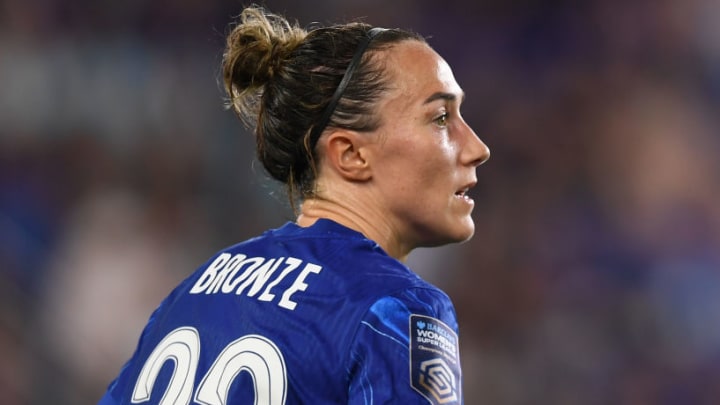She’s Coming Home: England's Lucy Bronze Sets Her Eyes on the Prize at Chelsea

Lucy Bronze’s first competitive outing in a Chelsea kit wasn’t in Kingsmeadow or Stamford Bridge, but more than 3,000 miles from London in New Jersey’s Red Bull Arena. Her Blues trekked across the Atlantic Ocean for a U.S. swing which kicked off with a Monday night friendly against NJ/NY Gotham and concludes this Sunday in Washington, D.C., against WSL rival Arsenal. Unsurprisingly, the New Jersey crowd was out in full force for their NWSL side, but Bronze—who signed with Chelsea last month—received an ovation from the fans, too. Loud cheers trailed her name after being announced in the starting lineup, a testament to her global reach.
An American debut with an English club for a Lionesses star may sound like an oxymoron, but for Bronze, it was a fitting stage to start her Chelsea campaign. The 32-year-old is no stranger to competing in the States, having attended the University of North Carolina in 2009 to play for the famed collegiate program.
“The biggest changing point in my career in understanding how to be competitive was at 17, I went to UNC with [head coach] Anson Dorrance,” Bronze says. She joined a stacked roster that included—among other big names—U.S. women’s national team stars Meghan Klingenberg, Ashlyn Harris and Tobin Heath.
“I could remember Ashlyn Harris screaming at me in my very first session,” Bronze recalls. “It didn’t scare me, I just thought O.K. That was the first time I’d been around a bunch of girls who were the same as me. That was the first moment I was like, You know what, it’s cool to be competitive. It’s cool to want to be a winner.”
That type of relentlessness wasn’t necessarily being fostered among young girls in England at the time, something Bronze says she’s glad to see has changed. But nearly 15 years ago, it took going to North Carolina to draw out her fierceness on the pitch.
“Taking that American mentality at such a young age, I was a sponge and I already had it in me and it went through the roof,” Bronze says. “I came back to England and people were like, Calm down Lucy. You don’t need to win everything. And I was like, Of course I do.”
“Win everything” seems to be a fitting mantra for Bronze, as she’s amassed an impressive trophy cabinet over her winding career. For country, Bronze helped lead England to the 2022 Euro title, followed by a World Cup final appearance a year later. For club, she’s won every domestic title there is to win, also claiming five UEFA Women’s Champions League titles, winning three with Lyon and two with Barcelona. Now, after leaving Barcelona for a two-year deal with Chelsea, she wants to lift the trophy for a sixth time—this go-around with an English side.
“Playing for England and the effect that we have on the country has always been amazing when we win,” Bronze says. “I feel like domestically being able to do that as well, having been part of a Lyon and a Barça, and how they domestically changed their game, that would be a real big dream of mine, to actually bring the Champions League back to England after so many years of Spain and France and Germany dominating the Champions League.”
She’ll look to do so with a Chelsea group in transition, as new manager Sonia Bompastor takes over for Emma Hayes, who left her post after 12 years to join the USWNT as manager. Bompastor, who led Lyon to a Champions League trophy in 2021–22, has plenty of familiarity with Bronze, as Bompastor ran the Lyon academy while the star defender was playing for the club.
“She’s a great person,” Bompastor said of Bronze after Chelsea’s 3–1 win over Gotham FC. “I think she’s a leader, so it’s something really good to have in the squad, in the locker room.”
Describing herself as “very, very shy,” leading hasn’t always come naturally to Bronze. Others, including her mom and England coaches, had to urge her to step into the role.
Bronze remembers in her early 20s, her mother telling her that “people are going to listen if you have something to say.” The star defender’s knee-jerk reaction was to respond, No one wants to listen to me. Slowly, however, she began to realize that maybe there was a bit of truth in what those around her were saying.
“I kind of grabbed the role with two hands, because I want to do everything I can to make sure the teams that I play for, I can give them everything and put them in the best position possible,” Bronze says. “But it’s definitely a confidence that I’ve had to work on.”
Bronze’s mom and aunt stood up for young Lucy when she wasn’t allowed to play with the boys anymore or had to find a new team. They also inspired the star defender to speak up beyond her role as a footballer. She compares the “strong women” who raised her to friend and fellow soccer superstar Megan Rapinoe, who she also credits as a role model.
“I’ve always said to [Rapinoe], I appreciate so much what she’s done for the game because she’s paved this way for other athletes like myself to think, You know what, she’s stood up and she’s speaking out for people who maybe can’t speak and trying to do the right thing,” Bronze says. “That helped me in my career and I think maybe I can do that for somebody else and even if it’s just one person, that would mean the world to me.”
It’s a platform Bronze couldn’t fathom having at the beginning of her career. She, like Rapinoe, is part of a generation of players that have witnessed a tectonic shift in the women’s soccer landscape. Her career has undergone a meteoric rise in popularity and provided opportunities once considered completely unrealistic. A common anecdote among those recounting Bronze’s illustrious career is her start working part-time in a Domino’s pizza shop while training at Leeds (the establishment has since been re-named in her honor). It’s a job Bronze said she loved, but she knows as well as anyone what a precious resource time is for an elite athlete. Not to mention, money.
So, is she resentful of the more arduous path she had to take compared to today’s players, many of whom enjoy more eyeballs, endorsement deals and readily available resources? Not at all. In fact, she says she considers herself fortunate, acknowledging that so many women’s athletes still work part-time jobs or are contending with club ownership that isn’t committing the dollars they promised to their women’s teams.
“The start of my career was pretty close to rock bottom and I’m at the top of my career,” Bronze says. “I’ve been able to be part of the highs of selling out Wembley and winning the Euros. I genuinely feel so lucky to have experienced both sides of it. To have that outlook to be so grateful for everything while still driving for more, because I know where we’ve come from, where we are now and what more needs to be done.”
The only thing Bronze may care about as much or more than winning is improving the game she fell in love with as a little girl. It’s a refrain you often hear from the Rapinoes and the Martas who occupy a unique era in women’s soccer, with many seeing the game grow and professional environments blossom during their careers. Bronze’s hope is that all the newfound enthusiasm and infrastructure and money translate to an even better product on the pitch.
“I want the spectacle to be getting better, the technical ability to be getting better, the physicality to be getting better,” Bronze says. “Having been at the bottom of the game, and pushing myself so hard to get where I am. The players now have got even more than what I had then, and I hope that they are 10 times the player I am.
“The floor is theirs. We’ve built it up, we’re ready for women’s soccer to take over the world.”
Bronze isn't ceding the floor just yet, though. By signing a two-year contract with Chelsea, the stage is set and the star defender has been clear about her intentions. She wants to bring the women’s Champions League trophy home to England, something that hasn’t been done in nearly two decades.
